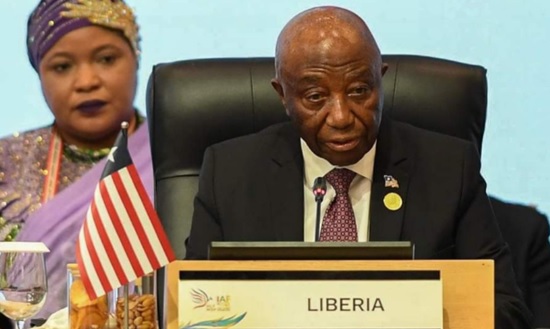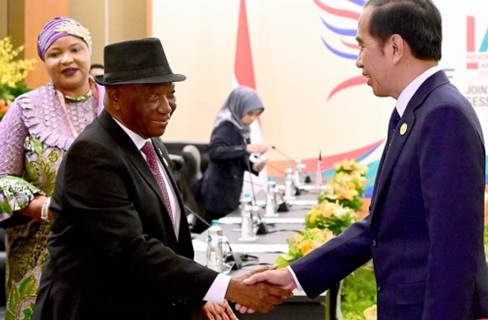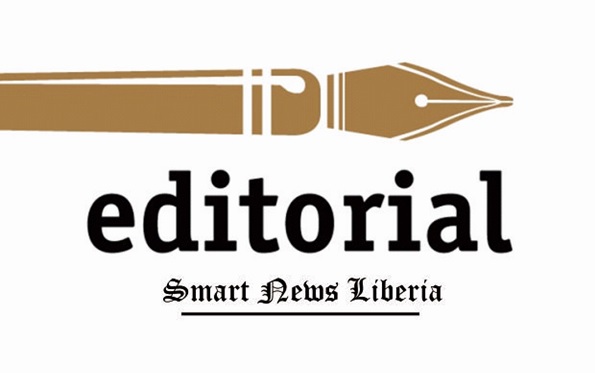INDONESIA – In a compelling keynote address at the Indonesia-Africa Forum, President Joseph Nyuma Boakai of Liberia articulated a bold vision for his country’s future while underscoring the deep-rooted partnership between Liberia and Indonesia. Addressing a distinguished audience that included Indonesian President Joko Widodo, President-Elect Prabowo Subianto, and other prominent figures, President Boakai extended his heartfelt appreciation to the Government of Indonesia for their warm hospitality and for organizing such a significant event.
President Boakai reminisced about the long-standing relationship between the two nations, highlighting that their collaboration spans over fifty years. From Liberia’s involvement in the 1955 Asia-Africa Conference in Bandung to the formal establishment of diplomatic relations in 1965, Liberia and Indonesia have built a strong foundation of friendship and cooperation. This history, he noted, is a testament to their shared commitment to fostering peace, development, and mutual prosperity.
At the heart of President Boakai’s speech was the introduction of the “ARREST Agenda,” a comprehensive development strategy designed to address Liberia’s growth challenges and opportunities. The ARREST Agenda focuses on six pivotal areas: Agriculture, Roads, Rule of Law, Education, Sanitation, and Tourism. Each pillar reflects a critical component of Liberia’s strategic vision for sustainable development.
The President emphasized Liberia’s agricultural potential, noting the country’s rich, fertile lands as a significant asset for enhancing food security and boosting economic empowerment. He expressed a desire for collaboration with international partners to develop Liberia’s agriculture sector, aiming to create a robust agricultural industry that can stimulate economic growth and improve livelihoods.
Infrastructure development, particularly through the enhancement of road networks, was another key focus. President Boakai highlighted the importance of modernizing Liberia’s infrastructure to facilitate internal and external trade, connect communities, and support overall economic prosperity. Improved roads are seen as vital for integrating Liberia more effectively into regional and global markets.
The President also stressed the importance of upholding the Rule of Law, emphasizing that good governance, integrity, and accountability are essential for creating a stable environment that attracts investment. By reinforcing the rule of law, Liberia aims to foster a trustworthy and transparent business climate that encourages both local and international investors.
Education was identified as the cornerstone of Liberia’s future, with President Boakai underscoring the need to invest in the nation’s youth to prepare them for the challenges of a rapidly evolving world. He called for increased support in educational initiatives, which he believes will empower individuals and drive societal progress.
Sanitation, too, was highlighted as a critical area of focus. The President underscored the need for better health and hygiene practices to enhance the quality of life for Liberians and build a healthier, more productive workforce. He appealed to international partners to join Liberia in efforts to improve sanitation and public health.
Tourism was presented as a vibrant sector with the potential to showcase Liberia’s rich cultural heritage, biodiversity, and natural beauty. President Boakai proposed the establishment of a Resident Embassy of Indonesia in Liberia to deepen bilateral ties and explore new investment opportunities. He invited Indonesian businesses to consider investing in Liberia, envisioning a partnership that leverages both countries’ strengths to drive economic growth and development.
In concluding his remarks, President Boakai expressed his gratitude for the scholarships provided by Indonesia, which have been instrumental in advancing Liberia’s human capital development. He reaffirmed Liberia’s commitment to strengthening its relationship with Indonesia and other international partners, emphasizing the importance of collaborative efforts to unlock the full potential of both nations and build a brighter future for their people.







